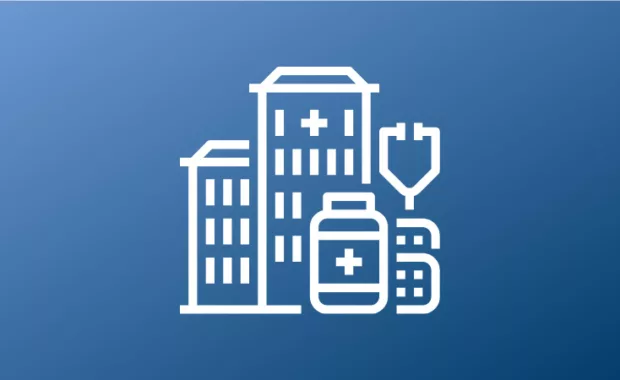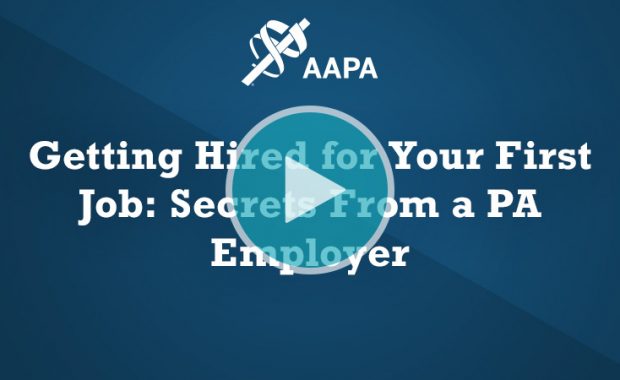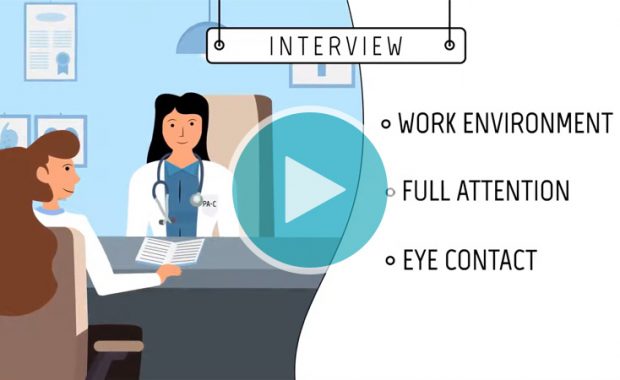Career Resources
Interview Prep
The interview is your first chance to show why you are the best candidate for the position. It’s also a chance for you to understand more about the practice or organization and its culture, approach to patient care, and knowledge of team practice.
For New PA Graduates: Setting Yourself up for Success at your First Job
Setting yourself up for success in your first PA position involves a number of factors. In this article, the PA Career Coach provides guidance on how to identify a supportive first employer, negotiate a contract that ensures your success, and acclimate to life as a PA-C.
Specialty Transitions: Researching the Best Options for You
PA Career Coach Jennifer Hohman frequently works with clients who are considering changing their specialty. Find out how she helps her clients find the right specialty for them through careful self-assessment, research, and networking.
Interviewing in Different Formats: Insights for a Great Meeting
Preparing for a virtual interview is very similar to preparing for an in-person interview, but there are special considerations. Read on to learn how Jennifer Hohman, the PA Career Coach, advises her clients to prepare for a virtual interview, and why you should schedule a practice call with a trusted friend before the big day.
Pre-Graduation Checklist
If you are a PA student who is nearing graduation, you have a lot to think about as you prepare to launch your PA career. Stay on top of all the major milestones and deadlines you have ahead of you with the following checklist.
Reference List Template
This reference list template was created by AAPA’s Early Career PA Commission and is intended to help guide PAs in all career stages, including PA students, who are asked to provide a list of references to a prospective employer.

How to Tailor Your Job Application for a Specialty Transition
Any successful career transition is rooted in self-knowledge, curiosity and a zestful movement towards what inspires you as a clinician. PAs have unique career journeys given their ability to navigate specialty transitions that can be both exciting and daunting.
Navigating the Job Search as a New Grad
Finding your first PA job is challenging enough, and even more so during a pandemic. Join AAPA for this webinar about navigating a job search as a new grad.

AOP Guide
Explore a new career direction or specialty with this collection of AAPA and partner resources, salary data, and CME on various practice areas, including Administration, Dermatology, Education, Emergency Medicine, Family Medicine, Hospital Medicine, Internal Medicine, Orthopaedic Surgery, Telemedicine, and Urgent Care.

Getting Hired for Your First PA Job: Secrets From a PA Employer
Come hear tips and tricks as you prepare for the PANCE. From study hints to day-of pointers, this session is for all the test takers… the cautiously optimistic, the nervous wrecks, and all those in between.

Sponsored
Why I Changed Specialties as a PA
One of the major advantages of becoming a PA is that it is relatively easy to change from one specialty to another without the need for new certification. More than 50% of PAs will change specialties during their careers, according to AAPA’s Salary Report.

One Interview Tip I Would Give to All PAs
Career and leadership expert Andrea Lowe, MHA, PA-C, shares advice on how to effectively prepare so that you stand out from the crowd during job interviews. Anticipate competition for any job you’re interviewing for and do your homework.

Video: Job Interviewing Tips for PAs
The interview is your first chance to show why you are the best candidate for the position. Our video will help you prepare for your interview and help you show off your best self.
PA Student to PA: Navigating the Transition
While the transition from program to practice may seem overwhelming and nerve-wracking, PA students can set themselves up for a successful career start with these tips.
Handling Difficult Interview Questions
Interviews can be stressful, no doubt about it! I’ve found in my work with PA clients that preparation (especially for difficult questions) is an effective way to promote confidence and even turn anxiety into excitement about meeting with a prospective employer. Effective preparation involves careful assessment of your abilities as a clinician (and person) and how they correspond to the job, and also working out your replies to commonly asked difficult questions in advance.

